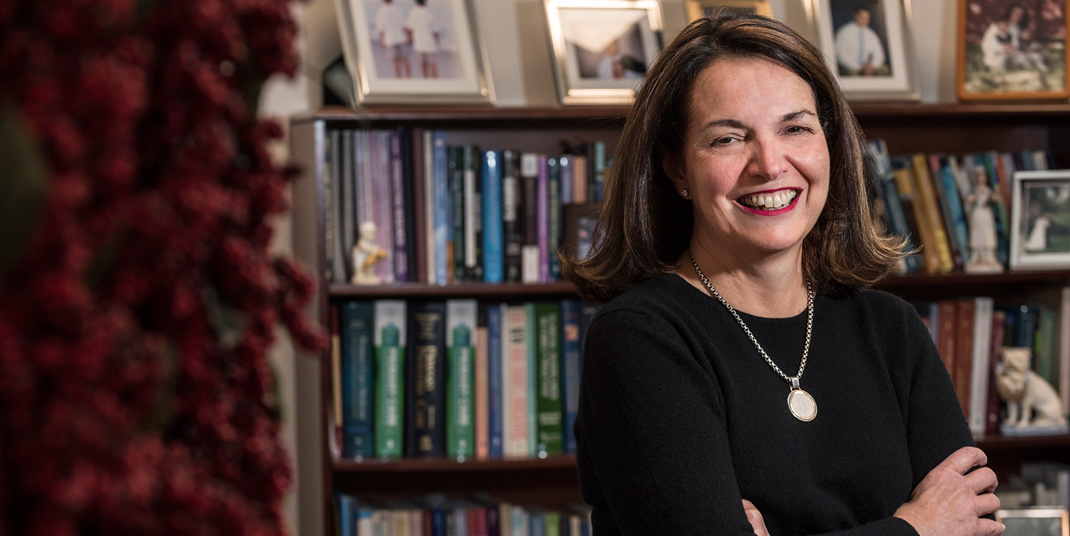Connell School of Nursing Associate Dean for Graduate Programs Susan Kelly-Weeder, president-elect of the National Organization of Nurse Practitioner Faculties, will oversee the new Doctor of Nursing Practice program. (Lee Pellegrini)
The Connell School of Nursing will launch a new doctoral degree, the Doctor of Nursing Practice (DNP), in the fall of 2019 to prepare nurses for advanced practice roles. This new degree will have an increased emphasis on clinical practice, with the goal of improving patient outcomes in an increasingly complex health care system.
The DNP degree was developed to prepare advanced practice nurses — nurse practitioners, nurse anesthetists, nurse midwives and clinical nurse specialists — at the highest level of clinical practice. Across the country, schools of nursing are transitioning advanced practice education from the master's to the doctoral level, according to Connell School administrators.
At its most recent national conference, the National Organization of Nurse Practitioner Faculties (NONPF) stated its support for the DNP as the required educational preparation for nurse practitioners to enter practice by 2025. NONPF is recommending a seamless transition from baccalaureate nursing preparation to DNP preparation for nurse practitioner students and, along with their LACE (legal, accreditation, certification and education) network partners, is working to remove all barriers to seeing this become a reality. This future change will not affect current nurse practitioners with master's degrees who keep their certification up to date.
The DNP will provide nurse practitioner students with more clinical experience than the Connell School's current master's program does, as well as additional content in the areas of quality, safety, informatics, policy and leadership, according to CSON Associate Dean for Graduate Programs Susan Kelly-Weeder, who will oversee the DNP program.
"It is simply a better way to make a nurse practitioner," said Kelly-Weeder, who has been on the CSON faculty since 2004. "The approach is much more comprehensive. Students will learn not only how to provide care but also how to improve care."
This month, Kelly-Weeder was named president-elect of the National Organization of Nurse Practitioner Faculties, an organization devoted to promoting high quality nurse practitioner education at both the national and international levels. She will hold the post of president-elect for two years and then assume the presidency of NONPF for the following two years.
She sees a great deal of synergy between her role in NONPF and as head of CSON's new DNP. "I'm really excited," said Kelly-Weeder, who calls this advancement for nurse practitioners "revolutionary."
"It is simply a better way to make a nurse practitioner," said CSON Associate Dean Susan Kelly-Weeder, newly named president-elect of the National Organization of Nurse Practitioner Faculties.
The movement to doctoral prepared nurse practitioners, said Kelly-Weeder, is in response to the changes nurses are seeing in their patients and within the health care system in recent years.
"Patients are living longer, with complex medical needs. That, combined with the complexity of the health care system, means nurse practitioners need to be equipped with clinical expertise based on evidence-based practice, leadership skills, and an understanding of health care policy."
A key requirement of the DNP will be the successful completion of a clinical practice project that will be driven by the real-life needs facing the health care settings where students are assigned.
The DNP provides nurses seeking a terminal degree with an option for the PhD. While the PhD appeals to nurses who want to be researchers and work on developing original research, said Kelly-Weeder, the DNP is for nurses seeking advanced practice roles, the highest level of clinical nursing practice and the ability to translate research into practice within the clinical setting.
In an increasing number of states nurse practitioners have been granted independent practice (i.e., are not required to have physician supervision) and in fact can open their own practices, said Kelly-Weeder, who is a family nurse practitioner and a Fellow in the American Academy of Nurse Practitioners. "The DNP will prepare nurses to be the very best advanced practice nurses possible and the BC NP student will be prepared to provide primary care throughout their communities."
Students entering CSON's new DNP program will be able to earn their degree in as few as two years for post-master’s entry or as few as three years for direct entry or post-baccalaureate, depending on whether they go full- or part-time. Kelly-Weeder expects that CSON will offer the only direct-entry DNP in the Boston area when it accepts students from non-nursing fields starting in 2020.
—Kathleen Sullivan | University Communications




